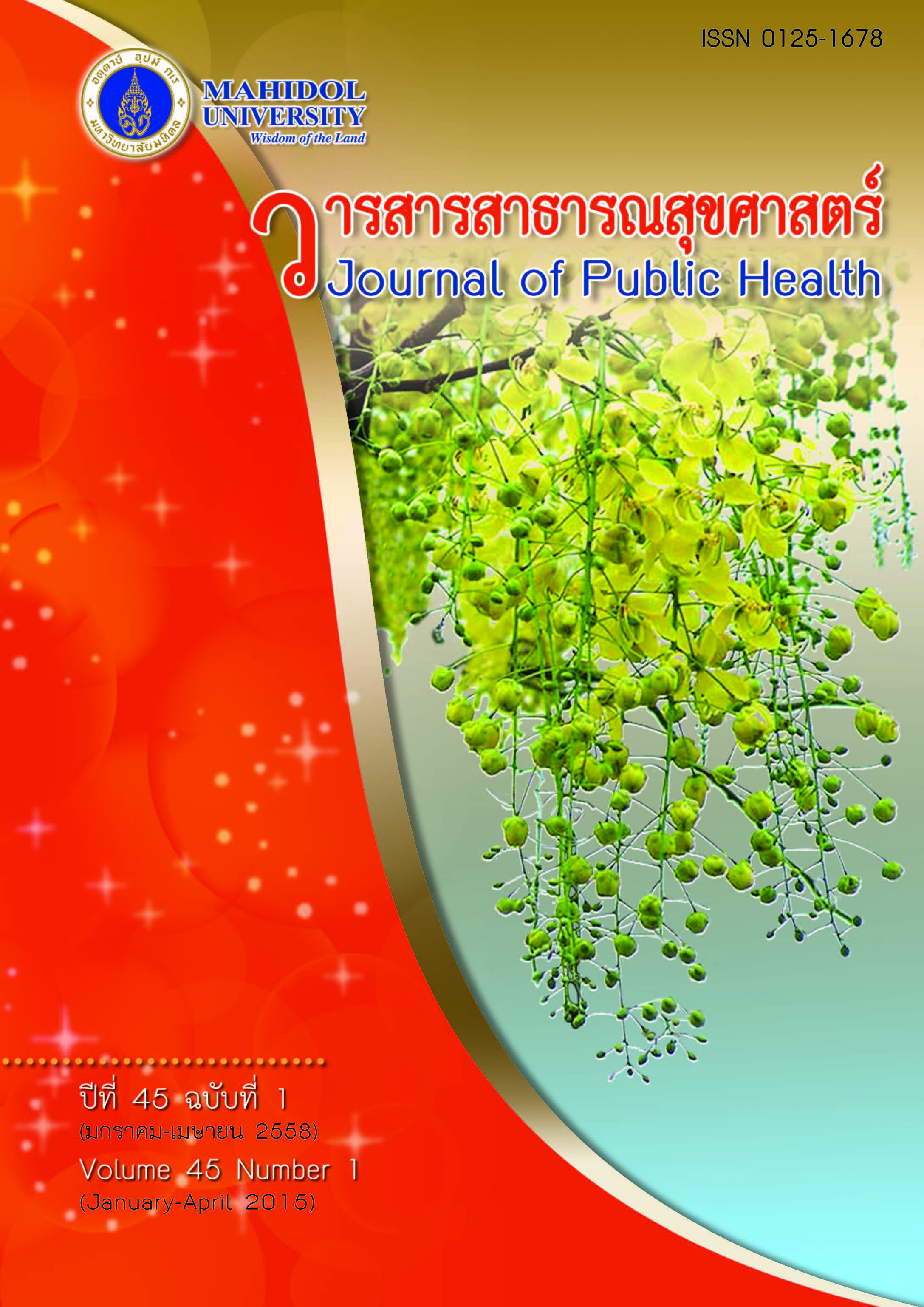ผลของการบริโภคชาอู่หลงต่อระดับไตรกลีเซอร์ไรด์ในเลือดหลังอาหาร: การศึกษาวิจัยแบบสุ่มชนิดปกปิดสองด้านมีกลุ่มควบคุมและสลับกลุ่ม
Keywords:
ชาอู่หลง, โอทีพีพี, การดูดซึมไขมัน, ไตรกลีเซอร์ไรด์, Oolong tea, OTPP, fat absorption, triglycerideAbstract
บทคัดย่อ
ชาอู่หลง คือ ชาที่ผ่านกระบวนการบ่มแบบกึ่งหมักจากใบชาสด ซึ่งมีสารออกฤทธิ์ทางชีวภาพหลัก ได้แก่ อู่หลงที โพลีเมอไรซ์ โพลีฟีนอล หรือ โอทีพีพี การศึกษาวิจัยก่อนหน้านี้พบว่า ชาอู่หลงสามารถลดการดูดซึมไขมันได้โดยยับยั้งเอนไซม์ไลเปส ทำให้เพิ่มการขับไขมันออกทางอุจจาระ การศึกษาวิจัยครั้งนี้จึงมีวัตถุประสงค์ เพื่อศึกษาผลของการดื่มชาอู่หลงต่อระดับไตรกลีเซอไรด์ในเลือดหลังอาหาร โดยมีรูปแบบการศึกษาเป็นแบบสุ่มชนิดปกปิดสองด้านมีกลุ่มควบคุมและสลับกลุ่ม (randomized, double-blind, placebo-controlled crossover study) ผู้เข้าร่วมวิจัยถูกแบ่งออกเป็น 2 กลุ่ม คือ กลุ่มชาอู่หลง จำนวน 15 คน และกลุ่มชาหลอก จำนวน 15 คน โดยผู้เข้าร่วมวิจัยดื่มชาอู่หลง (มีโอทีพีพี 70 มก.) หรือ ชาหลอก (มีโอทีพีพี 0 มก.) ปริมาณ 500 มล. และซุปข้าวโพด (มีปริมาณไขมัน 40 กรัม) ผู้เข้าร่วมวิจัยถูกเก็บตัวอย่างเลือดก่อน-หลังดื่มชาอู่หลงหรือชาหลอก และซุปข้าวโพด ที่เวลา 1, 2, 3, 4, 5 ชม. ผลการศึกษาพบว่า ชาอู่หลงสามารถลดระดับไตรกลีเซอไรด์ในเลือดหลังการบริโภคซุปข้าวโพดที่มีไขมันสูงได้อย่างมีนัยสำคัญทางสถิติ นอกจากนี้ยังพบว่า พื้นที่ใต้กราฟของระดับไตรกลีเซอไรด์ในกลุ่มที่ดื่มชาอู่หลงลดลงอย่างมีนัยสำคัญทางสถิติ เมื่อเปรียบเทียบกับชาหลอก และไม่พบความแตกต่างของอาการหรือผลข้างเคียงระหว่างกลุ่มที่ดื่มชาอู่หลงและชาหลอก จากการศึกษาครั้งนี้จึงสรุปได้ว่า การดื่มชาอู่หลงที่มีสารโอทีพีพี 70 มก. สามารถยับยั้งการดูดซึมไขมัน ทำให้ระดับไตรกลีเซอไรด์ในเลือดหลังบริโภคอาหารที่มีไขมันสูงลดลงได้ ดังนั้นการดื่มชาอู่หลงจึงอาจเป็นทางเลือกหนึ่งที่ใช้สำหรับป้องกันโรคอ้วน หรือช่วยควบคุมน้ำหนักตัวได้ อย่างไรก็ตามเราควรเลือกดื่มชาอู่หลงที่ปราศจากน้ำตาลร่วมกันกับการควบคุมอาหารและออกกำลังกายเป็นประจำเพื่อการควบคุมน้ำหนักตัวได้อย่างถาวร
The Effect of Oolong Tea Consumption on Postprandial Triglyceride Levels:
A Randomized, Double-blind, Placebo-controlled Crossover Study
ABSTRACT
Oolong tea is produced by the semi-fermentation of the fresh leaves of Camellia sinensis. The major bioactive compound in oolong tea is oolong tea polymerized polyphenol (OTPP). Previous studies found that oolong tea reduces the absorption of fat by inhibiting lipase enzyme resulting in increased fecal lipid excretion. The objective of this study was to examine the effect of oolong tea on blood triglyceride levels after fat intake. Study design was a randomized, double-blind, placebo-controlled crossover study. The subjects were randomly divided into 2 groups; oolong tea group (n = 15) and placebo group (n = 15). The subjects were served 500 mL oolong tea (70 mg OTPP) or placebo to drink and both groups consumed 200 g corn soup (40 g fat). Blood samples were taken before and at the 1st, 2nd, 3rd, 4th, and 5th hours after the consumption of oolong tea and corn soup. The oolong tea significantly decreased changes in the triglyceride level after fat intake. As shown by the incremental blood triglyceride area under the curve (AUC), oolong tea significantly suppressed the postprandial elevation in incremental blood triglyceride AUC compared with placebo. No significant differences in adverse symptoms were observed between groups. Therefore, oolong tea containing 70 mg OTPP can decrease postprandial blood triglyceride after fat intake by blocking fat absorption, suggesting that oolong tea may be a promising anti-obesity agent for weight control. However, we recommend drinking oolong tea without sugar so that it will not increase calorie intake and contributes to a healthy diet, which with regular exercise can contribute to permanent weight control.
Downloads
Issue
Section
License
Creative Commons License CC-BY-ND


